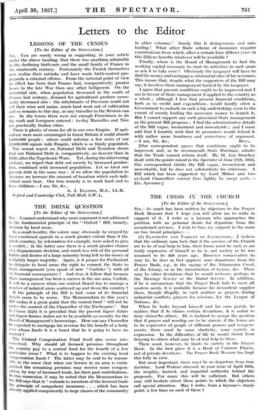THE DRINK QUESTION
[To the Editor of the SPECTATOR.]
SIS,—I cannot understand why more argument is not addressed to the fundamental principle of the " Oxford " Bill, namely, decision by local areas.
In a small locality, the voters may obviously be swayed by local emotional appeals to a much greater extent than if the whole country, by referendum for example, were asked to give a verdict ; in the latter case there is a much greater chance of a dispassionate decision, and much less risk of the personal habits and desires of a large minority being left to the mercy of a slightly larger 'majority. Again, is it proper for Parliament to delegate to local areas the right to commit the State to State management (you speak of new " Carlisles ") with all its financial consequences ? And does it follow that because State management has been a success in the one area, Carlisle, It will be a success when one central Board has to manage a number of isolated areas scattered up and down the country ?
If the principle of the Bill is bad, some of its financial details seem to be worse. The Memorandum to this year's fill makes it a great point that the central fund "will not be under the control of the Chancellor of the Exchequer." But In Clause 21(8) it is provided that the present liquor duties and liquor licence duties are to be available as security for the Hoard of Management's borrowings. How can any Chancellor he expected to mortgage his revenue for the benefit of a body over whose funds it is a boast that he is going to have no control ?
The Central Compensation Fund itself also seems mis- conceived. Why should all licensed premises throughout the country pay to a central fund for the benefit of a few Particular areas ? What is to happen to the existing local mulpensation funds ? The latter may be said to be reason- 3ble in the sense that when one licence in an area is extin- guished the remaining premises may receive some compen- sation, by way of increased trade, for their past contributions. In this connexion it may be noted that the Memorandum to the Bill says that it" extends to members of the licensed trade the principle of compulsory insurance . . . which has been already applied compulsorily to large classes of the community in other schemes.- Surely this is disingenuous and mis- leading! What other State scheme of insurance requires contributions from which, after a certain time (fifteen years in this Bill) no benefits whatever will be available ?
Finally, where is the Board of Management to find the working capital necessary to start its activities in such areas as ask it to take over ? Obviously the taxpayer will have to find the money and mortgage a substantial slice of his revenues. This means that, despite what the supporters of the Bill may say, it involves State management backed by the taxpayer.
I agree that present conditions ought to be improved and I am in favour of State management if applied to the country as a whole ; although I fear that present financial conditions, both as to credit and expenditure, would hardly allow a Government to embark on such a big undertaking, even to the extent of merely lending the necessary money to launch it. But I cannot support any such piecemeal State management as the present Bill proposes ; I find the administrative details of the Bill vague, inconsistent and unworkable ; and I must add that I heartily wish that its promoters would defend it with rather more frankness and correctness of argument.
[Our correspondent agrees that conditions ought to be improved, and, as he recommends State Purchase, admits that the Trade cannot reform itself. Mr. St. Loc Strachey dealt with the points raised in the Spectator of June 27th, 1925. Our correspondent thinks the Bill vague, inconsistent and unworkable, but he does not substantiate his criticisms. A Bill which has been supported by Lord Milner and two ex-Lord Chancellors cannot thus lightly be swept aside.---. ED. Spectator.]










































 Previous page
Previous page